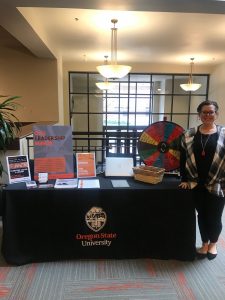Returned AgriCorps Fellow: Kelsey Knight
Placement: Korm Junior High School, Korm, Eastern Region, Ghana
Class: 2 (2015-16)
I am now working on my Masters in Agricultural Education at Oregon State University. I am a graduate teaching assistant so I split my time between teaching related tasks (instructing, grading, developing lessons), research, and taking classes. My favorite class I’m teaching is Introduction to Extension!
How did your time as an AgriCorps Fellow lead you to the next step in your career?
My time as an AgriCorps Fellows certainly led me to pursuing my masters. One of the biggest lessons I learned through AgriCorps was that I didn’t know everything. So, to deepen my understanding of teaching, learning, working with people, leadership and more, I knew going to graduate school was the logical next step. I could’ve chosen multiple masters programs, but AgriCorps allowed me to further fall in love with teaching so Agricultural Education was the perfect fit.
What similarities do you see between agricultural education in the U.S. and Ghana?
I see many similarities in the youth that participate in ag ed programs in the US and in Ghana. The youth that are taking the classes want to learn, want to grow and want to better the industry. Additionally, there’s a similar resiliency between the two groups of youth. You can tell any story of a youth that worked tirelessly on a project; they woke up before the sun, put in hours of dedication, sold their project, made a profit, and used that profit to better themselves. Without names or content, it could easily be either location.
Why did you choose to be an AgriCorps Fellow?
AgriCorps sparked my interest because of the 4-H work association with the Fellowship. I grew up active in 4-H and many of experiences with 4-H led me to my degree choice in college, Community and Leadership Development. After I did more research, I realized AgriCorps was far more than working with 4-H clubs in Ghana. It was an opportunity to impact myself, young agriculturalists, communities, and food security through the work of agricultural education.



